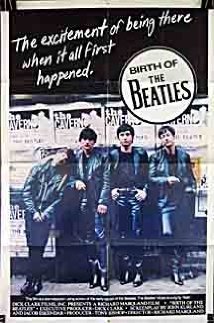Plot
The film starts in 1959, when the Silver Beatles (as they were then called) consisted of John Lennon, Paul McCartney, George Harrison and Stuart Sutcliffe. They need a drummer and a manager, and although Sutcliffe can sing, he cannot play an instrument. The only reason Stu is in the band because he is John's friend; none of the others want to play the bass guitar. They go and audition for an agent, where they meet Rory Storm and the Hurricanes, eventually becoming good friends with the Hurricanes' drummer, Ringo Starr. The agent at the audition says that if they get themselves a permanent drummer, they can have a job in Scotland, and then afterward a job in Hamburg, Germany.
The Scotland gig occurs, but is not shown onscreen. The band finds a long-term drummer in Pete Best, whose mother owns the teenagers' hangout spot The Casbah Coffee Club. They begin to prepare for the trip to Hamburg, which lasts several months; they encounter disapproval from John's girlfriend Cynthia and John's Aunt Mimi. When they reach Hamburg, they discover they are playing in the Indra Club on the Reeperbahn, Hamburg's notorious sex district. They play long, grueling hours – up to eight hours a night, seven days a week – and stay active by taking Preludin, an appetite-suppressing stimulant drug. They are living in the back of the Bambi Kino, a run-down old cinema. While in the Indra, they play loudly and wildly, eating, spitting, and drinking onstage, inviting women to dance on stage with them, etc. Things get so loud that the club is eventually shut down.
Now renamed The Beatles, the band began to perform at the bigger Kaiserkeller club, becoming a big hit among the German audience. While there, they meet up with Ringo and Rory Storm, who are also performing there, and Stu falls in love with German photographer Astrid Kirchherr. Stu and Astrid begin to have a love affair. Suddenly, in the middle of a gig, German police burst into the club and arrest George for working underage without the proper work permit. While searching for the paperwork to release George, Paul and Pete drop a candle that sets fire to the Bambi Kino, and the whole band is deported.
The downbeat Beatles struggle at home with their disapproving families, but gradually their reputation grows; they play shows that fill the concert halls. One night after a performance, Stu is attacked and badly beaten by a gang outside. His friends rescue him, but Stu refuses to seek medical attention after being kicked in the head.
A month later, in 1962, the Beatles return to Hamburg. Stu reunites with Astrid and she cuts his hair into the famous moptop haircut. The others get their hair cut in the same manner and the Beatle haircut is born. They experience the same level of success as during the first trip, but Stu, a talented painter, wants to leave the group and attend art school and marry Astrid. However, before he can accomplish his dreams, he dies suddenly of a brain hemorrhage. The others find this to be emotionally shattering, and think if he only had seen a doctor, things would have turned out fine.
Back in Britain, the owner of the NEMS Records Shop, Brian Epstein, is alerted that the Beatles are causing quite a stir in Liverpool with their performances at the Cavern Club. He is impressed with what he sees and asks to be the group's manager. They accept and the Beatles have an audition for Decca Records, but are turned down. They keep searching for a record company to accept them, but are turned down time after time. They are beginning to lose all hope. Around this time, they learn that Epstein is a homosexual and that he was attacked by a Teddy boy in Liverpool because of it. However, they hold no prejudices and accept. Also, the Beatles finally get accepted by record producer George Martin, but decide to sack Pete from the group. In his place is Ringo, and now the classic foursome is complete. However, before the first show with Ringo, the fans react angrily to Pete's firing; they later become overly excited after hearing Ringo's drumming abilities and listen to "I Saw Her Standing There".
After their success, Cynthia announces to John that she is pregnant and the two decide to wed. The Beatles release their first single, "Love Me Do" and in 1963 release their first No. 1 hit single, "Please Please Me". They become the most famous group in Britain. In 1964, they are heading to America for the first time, after already encountering massive success across Europe. The film ends when the group arrives in America and performs on The Ed Sullivan Show to a mass of screaming fans, singing "I Want to Hold Your Hand".
